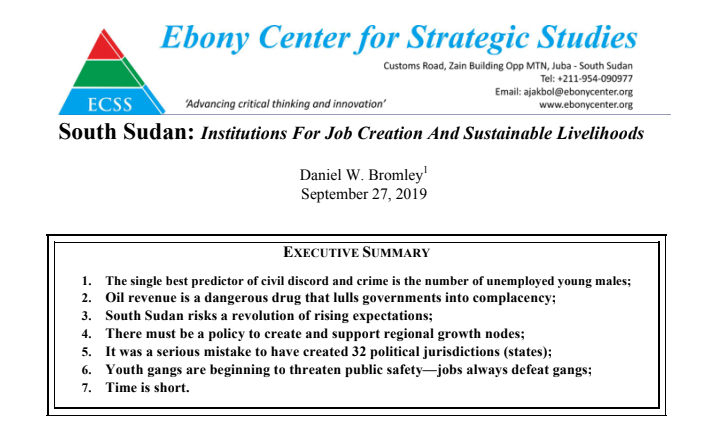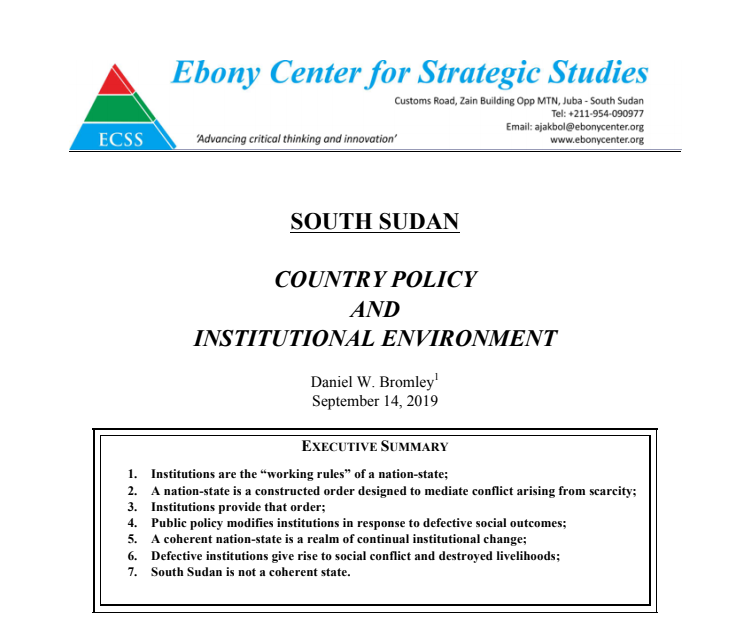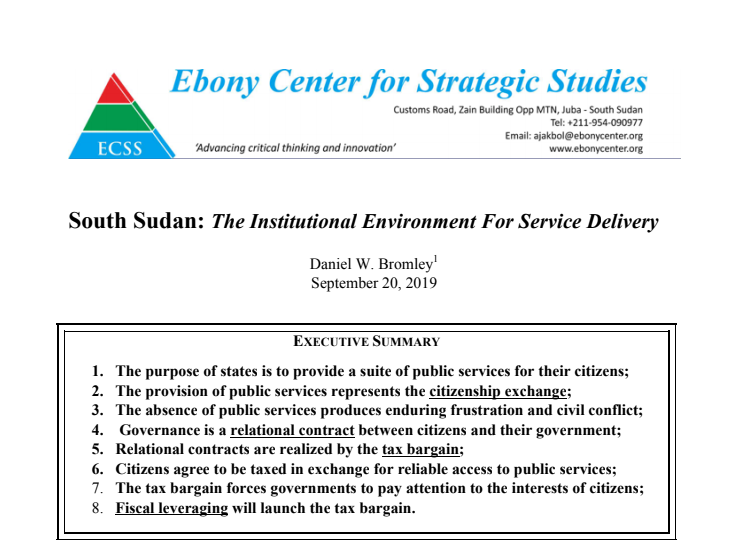Ebony Policy Note 2024-2 13 January 2024
The Misguided $9 Million Water-Tanker Purchase: A Critical Look at South Sudan’s Misallocation of Resources[1]
This Ebony Policy Note is triggered by the initial reactions within the Development Policy Forum (DPF) digital platform (DP) to the decision of the Economic Cluster of the Council of Ministers (CoM) of the Revitalized Transitional Government of National Unity (RTGoNU) of the Republic of South Sudan. Hence, the defining purpose of this Note is to contribute toward enhancing public policy debate in the use of scarce public resources on the one hand and to encourage, on the other, South Sudanese policymakers to pursue evidence-based decision-making processes. The Ebony Policy Note consists of five points: (1) analyzing the cost, (2) exploring alternative solutions, (3) calling for transparency, (4) looking at the economic implications of the decision, and (5) concluding the Note.
1. Analyzing the Cost: Is $90,000 per Water-Tanker Justifiable?
There are voices within the DPF-DP calling for a cost-benefit approach in debating the decision of the Economic Cluster. In scrutinizing the $90,000 price tag for a water-tanker within Juba City’s borders, a rigorous cost-benefit analysis is imperative to determine whether the expenditure is justifiable. As we dissect this figure, it’s essential to consider the multifaceted nature of the water resources and distribution landscape within the City. Both the public and private sectors play a pivotal role in the provision of water. Yet, the profound question lingers: does the hefty investment yield proportional returns in terms of water supply and reliability? Another question is the appropriateness of the level of government with respect to this particular decision – would it not be appropriate to assign this function to the Government of Juba City? We think this is within the scope of duty of the Mayor of Juba, who has the necessary mandate to go into public-private partnership (PPP) in the provision of basic services, such as water.
When engaging with the private sector, prices might often reflect the operational costs, market conditions, and profit margins deemed acceptable by businesses. However, in the case of the public sector, the concept of opportunity cost becomes quintessentially relevant—public funds allocated for water-tankers are funds diverted from other potentially critical infrastructure or services. Thus, it is not solely the immediate price of the water tankers that must be weighed but also the broader economic impact of such an investment on the City’s financial health and its citizens’ well-being. Here, the answers to the four questions posed by Prof. Dan Bromley are particularly of interest to this discourse.
Moreover, comparing the $90,000 cost against the backdrop of alternative solutions for water delivery and infrastructure development is crucial. Is there evidence to support that this level of spending on water-tankers is the most cost-efficient approach to address Juba City’s water-related challenges? Or could these funds be better leveraged to create more sustainable, long-term water solutions? With judicious analysis, we strive to unravel whether the high price of securing water through these means aligns with the common good and the principles of fiscal federalism underpinned by economic prudence.
2. Development Priorities: Exploring Alternative Water Supply Solutions
In addressing the growing concern of water scarcity in Juba City, we concur with the legitimate concerns raised in the DPF-DP that it is imperative to orient development priorities toward exploring alternative water supply solutions that meet both the economic and environmental demands of the present and future dwellers of the Juba City. These alternative solutions must be within the overall framework of the Public Financial Management (PFM) system. The FY2023/2024 is now in its third quarter of execution, and one wonders on what basis such a scheme is being undertaken. Is it an item in the supplementary budget that is yet to be presented to the Transitional National Legislature as required by law? Central to this endeavor is the meticulous execution of cost-benefit analysis, which brings to light the long-term sustainability of the proposed purchase of 100 water tankers.
Could this amount of $9.0 million be directed to accelerating the completion of the JICA-funded water project for Juba? The Juba City Council (i.e., government) and NOT the RTGoNU must, in our view, play a pivotal role in this evaluation, bearing in mind the opportunity cost of choosing one investment over another and the overarching need for sustainable water provision for the citizens of Juba City and surrounding counties. The point of departure of the proposed evaluation is the status of the implementation of the ongoing Juba City water project.
Furthermore, we think that the Mayor of Juba City and his government should seek partnership with the Chamber of Commerce in the provision of basic services to all the residents of Juba City. We believe that the private sector’s involvement can yield substantial benefits through the introduction of innovative technologies and efficient water management practices, ultimately influencing the price and affordability of water for the populace. Effective collaboration between the City Council and private entities can harness their respective strengths, minimize weaknesses, and drive the development of water infrastructure that is both cost-effective and reliable. As such, meticulous planning and strategic allocation of resources in Juba City are vital to ensure that the economic and social dividends of alternative water supply solutions can be realized, providing a cornerstone for both present and future generations to thrive.
3. Government Transparency and Decision-Making: Who Pulled the Strings?
In Juba City, the complexities of governance – RTGoNU, Central Equatoria State Government (CESG) – and the interplay between the public and private sectors are manifested in the critical issue of water resource management. As policymakers grapple with the allocation of this vital resource, the principles of fiscal federalism, cost-benefit analysis, and opportunity cost come to the fore, shaping decisions that carry widespread socioeconomic implications. The question of water pricing, in particular, underscores the tension between ensuring affordability for the populace and covering the expenses associated with purification, distribution, and infrastructure maintenance. We are aware of the fact that this is an election year, and the government is anxious to show some tangible results of its service delivery. Nevertheless, it is an entity like the Juba City Council that could expedite the implementation of basic services, such as water for Juba inhabitants.
Compounding this dilemma is the demand for government transparency, as stakeholders from both the public and private sectors and the general citizenry seek to understand the rationale behind the decision-making process. The private sector’s involvement often sparks concerns over profit motives potentially overshadowing the public interest, while the public sector is tasked with balancing fiscal responsibility with equitable service provision. The scrutiny of who exactly ‘pulled the strings’ in these decisions is pivotal, not only to foster trust through transparency but also to ensure that the long-term welfare of Juba City’s inhabitants and the stewardship of its resources are not compromised for short-term gains. In this regard, we think that the Economic Cluster of RTGoNU must take its hands off this water-tankers purchase scheme and allow the Government of Juba City Council to pull the strings.
4. Economic Implications: The Long-term Costs of a Short-sighted Investment
The pursuit of short-sighted investments without meticulous cost-benefit analysis can lead to dire economic implications, particularly when essential resources like water are involved. In South Sudan, the allure of swift monetary gains has occasionally prompted both private and public sector entities to overlook the long-term costs associated with such investments. It is imperative to understand that the price of immediate benefits can be outweighed by the eventual financial burdens that arise when the full spectrum of opportunity costs is not considered. What became the dura saga, crisis management saga, Letters of Credit (LCs) saga, and so on were noble ideas necessitated by the urgency of the moment and the propensity for swift monetary gains by influential individuals without political morality. Based on our bitter lessons of experience, this water-tankers purchase scheme should not be allowed this time.
For instance, if the focus on rapid infrastructure development compromises the sustainable management of water resources, the City could face future shortages that would not only elevate water prices but also impose hefty costs on future industries and residential areas alike. Subsequently, these higher operational costs would trickle down to consumers, exacerbating socioeconomic disparities. Therefore, strategic investment decisions must embody the division of responsibilities between the RTGoNU, CESG, and Juba City Council Government. It must also focus on a holistic viewpoint, incorporating environmental sustainability and long-term resource availability. When the private sector and the public sector (consensus within the three levels of government) align on such principles, the collective objective of fostering resilient and prosperous economic growth for Juba City materializes, mitigating the risks of incurring prohibitive long-term costs for seemingly lucrative, but ultimately unsustainable, short-term gains.
5. The Uncompromising Role of the DPF-DP
In concluding this Ebony Policy Note, it is reassuring to see the quick response from the DPFers to what we have called the misguided $9.0 million water-tanker purchase scheme. From the heart of Juba City, where water scarcity underscores everyday life’s struggles, the DPFers are raising their voices in opposition to the Economic Cluster’s fiscal priorities. They are calling for a careful cost-benefit analysis approach. This call is on the argument that this scheme falls within the mandate of the Juba City Council. Moreover, even if it were to be within the mandate of RTGoNU, the call would still stand in that public funds are being committed outside the PFM underpinning the approved FY2023/2024 budget and diverted away from crucial infrastructure improvements, particularly in the water sector, where the price of inaction is measured in human lives.
We, therefore, appeal to the Economic Cluster of RTGoNU to take note that the opportunity cost of not respecting the PFM procedures and our decentralization/federalism system is too high, especially when considering the responsibility and mandate of the Juba City Council as well as the potential role of the private sector to drive economic growth and improve living standards. The DPFers are particularly criticizing the Economic Cluster’s allocation of resources, challenging the justifications for outlays that do not directly confront the pressing needs of Juba’s inhabitants. By emphasizing a data-driven approach, these critics strive to shift the focus of government spending toward projects that promise tangible benefits for the populace. Their concern reflects a broader debate on national expenditure, demanding accountability and transparency in pursuing policies that should serve the public interest and well-being.
[1] Prepared by VEST, Ebony Center


